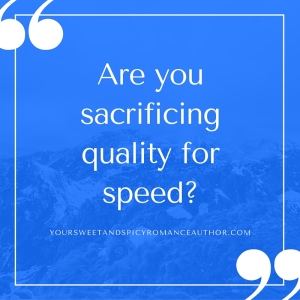 My peeps over at The Cerulean Project recently hosted a writer’s round table discussion (which you can watch here on YouTube) on writing faster vs. slower, a topic I’m particularly passionate about when it comes to exploring the art of writing and self-publishing. I’ve decided it’s time to vent my feelings on the subject. Most of my thoughts apply to my fellow self-published indie authors and/or writers who may be submitting to traditional publishers, but are not currently under contract. Remember, these are my thoughts based on my experiences. Feel free to agree or disagree in the comments.
My peeps over at The Cerulean Project recently hosted a writer’s round table discussion (which you can watch here on YouTube) on writing faster vs. slower, a topic I’m particularly passionate about when it comes to exploring the art of writing and self-publishing. I’ve decided it’s time to vent my feelings on the subject. Most of my thoughts apply to my fellow self-published indie authors and/or writers who may be submitting to traditional publishers, but are not currently under contract. Remember, these are my thoughts based on my experiences. Feel free to agree or disagree in the comments.
Since I started writing with the goal of publishing, I’ve learned many lessons, some of which have been harder than others to swallow. What continues to fascinate me is why writers believe they need to rush to publish. As a new writer, I thought I needed to write fast and publish multiple books a year in order to be a successful self-published author. In fact, I was seriously considering writing several books in advance with the goal of stacking the releases. After all, many authors do exactly that. Many marketing coaches tell authors to do exactly that. I’ve since changed my mind.
When I first dipped my toe into the waters of the self-publishing community, I was overwhelmed with information. Some good. Some bad. But there was no mistaking the encouragement from my fellow “swimmers” to jump in. “Write faster! Get your books published as quickly as possible.” I soon learned that was one of the biggest mistakes I could ever make as a new writer.
If you’re a seasoned writer, with a backlog of finished, unpublished books, you could decide to dust them off and polish them up with a professional edit. This I understand. However, I am no longer of the opinion writers need to push themselves to publish multiple books a year to be successful. Consider this, in the long run, could you maintain that type of publishing pace without slap-dashing stories together?
Writing is an art. An art I’ve come to love and respect. An art that takes time to learn and hone. It takes time to learn story, character development, plot, and how to weave them together to create an engaging read. So why are most self-published writers pushing to publish 3-4 books a year? (See my blog post When did writing become a quick-buck business? for more of my thoughts on making money self-publishing.)
Interacting with your audience and participating in the reading and writing communities are part of a writer’s life. An enjoyable one. It also makes good marketing sense. Those that love books, love talking about them. This is the essence of your local book clubs and the idea behind Goodreads. We all know the single best way to sell books, other than making sure your book is fabulous, is through word of mouth. The more I think about it, the more I believe the theory writers must publish several books in quick succession or else risk losing readers is nonsense. Engaging with fellow writers and readers does not mean you need to shove a book in front of them every 2-3 months. How on earth would you be able to provide quality books at such a rapid rate?
“I’m a fast writer,” you say. Great. Getting a first draft down on paper can be one of the most fulfilling experiences we have as writers. But a first draft, is a first draft. How long are you spending on research, rewriting, and self-editing? And what about your professional services: editors, proofers, formatters, and designers?
If you’re a new writer and thinking, “But I can do all those things myself,” you are sorely mistaken, my friend. You cannot edit your own writing. Let me repeat… You cannot edit your own writing.
Nora Roberts with her bestseller status and dedicated fans, does not edit her own writing. Her publisher employs teams of editors to get her manuscripts ready for publishing. One article I found online says it takes her about 45 days to write a book. That makes her a full time writing machine. Granted, over the years, Nora has probably streamlined her process and can bang her stories out faster than the rest of us. Most of us don’t have the experience to even attempt it. If you search her published books online, Nora Roberts averages two published books a year. Two. So unless you have a staff of full time editors on call, and have enough writing experience to submit first drafts to your editing team (which you should never do), how in the hell are you able to publish more books a year than the great Nora Roberts?
The only answer I can come up with is books published that quickly are crap. There. I’ve said it. Agree or disagree, feel free to voice your opinion in the comments. The fact of the matter is, even if you’re a full time writer, with a team of editors on staff, writing a good book and editing it to make it ready for publishing takes time.
I’ll give the naysayers the benefit of the doubt and agree that these books may not all be total crap. There may be a few entertaining ones (not great) lumped in with the bad. But how do you grow as a writer if you leave yourself no time to do so? When do you have time to explore themes, language, plot, social issues, tension, emotions, and all the other aspects of this art?
And what’s the rush? If you publish a subpar book, it will follow you forever. Are you really going to miss out on millions by taking the time to write a quality, unforgettable book? I doubt it. A quality book actually increases your chances to make a few dollars.
New writers/authors make this mistake all the time. I did. We’re excited. We’ve finally completed this epic task of writing a book and are ready to send it into the world. It took me 10 months to go from first draft to publish with my first book, Sweet Dreams, and I definitely rushed it. I ended up going back and getting professional editing after the fact. I will never make the mistake of publishing without professional editing again.
So when new writers and not so new writers hold their hands over their ears as they tread water and ignore the lifeguards on the shore offering good writing advice in exchange for marketing strategies, it drives me a little nutty. Those that have rushed to publish and learned our lesson are here to reel you in, not drown you.
There’s also the argument publishing too quickly can turn readers off. I’m a fast reader. I can average 2-3 books a week, but I don’t read at that rate all 52 weeks a year. There are times I take a break from reading. There are other times, when I’ve read several books by the same author, I need to take a break from the author to read other books on my list. At some point, a reader will be in the mood for something different than your voice. We can’t eat potatoes, potatoes, potatoes everyday. We crave variety. Why not build some buzz or anticipation around your work as you strive to improve each book over the last?
Good advice, IMO, I’ve received and agree with:
- Get your first draft down on paper and let it rest
- Don’t write in a vacuum. There are many great writing communities out there. Join in and network with your peers. Get advice. Get feedback. You are not alone.
- Whether you outline prior to writing or not, layout your finished manuscript on an outline to identify plot holes and review pacing
- Rewrite and let it rest
- Rewrite and let it rest
- Rewrite and let it rest (as many times as it takes until you have done everything you can possibly do to make it great)
- Self-edit and let it rest
- Send to professional editor for full edit
- Incorporate developmental changes into manuscript
- Let it rest
- Self-edit for language
- Send to editor for second pass: line-edit
- Incorporate changes
- Send to editor for final copy edit
- Send to proofer
- Let it rest
- Read through your finished manuscript with fresh eyes, once you’ve let it rest long enough to forget the words you wrote, to identify any remaining issues
- Repeat any of the steps above if additional work is needed
That is a lot to do in three months, and I didn’t include personal critique, alpha readers or beta readers, not to mention the availability of your editor and proofer, who may take several weeks to edit your first pass alone. It all takes time.
Bad advice, IMO, I’ve received and am no longer fooled by:
- Once you’ve finished your first draft, it’s ready for the editor (Nope. Please respect your work and your editor’s time. Both deserve your best effort. See above.)
- I can start self-editing as soon as I finish writing my first draft (Probably best to let it rest. Your eyes will not pick up on issues right away that will be glaringly obvious a month later.)
- I don’t need or can’t afford a professional editor (I call BS. I was naive and believed the same when I wrote my first book, knowing next to nothing about the publishing world or even where to look. Those of you reading this, who are just joining the writing community, I understand this misconception. But there are enough of us chanting, “Hire a professional editor,” now that it’s really hard to ignore. If you haven’t heard it yet, here it is… Hire a professional editor. You cannot edit your own writing. Put aside money while you write and save up. If you have questions about how to find an affordable editor that fits your needs, leave a comment. This bullet point is already too long to go into it here.)
- I need to release a book every four months (or faster) so I don’t lose my audience (IMO, you actually run the risk of burning out your audience faster that way and you leave yourself no room to actually work through the good practices above. It’s a marketing strategy, but can it be maintained over time without sacrificing quality? I think not.)
- I’m a fast writer. I pay for copy editing. That’s good enough (Why are you selling your abilities and your story short? You’re not giving yourself a chance to see what you can really do when you put all your effort into it. It should never be just good enough. It should be your best.)
These are all my opinions. If you disagree, leave a comment and tell me why. For my part, I care about the craft. I care about the art of writing. I want to learn and grow and discover. I want to write a book my readers will continue thinking about days later. There’s a huge difference between doodling and studying to become an artist. This takes time. Practice. Patience.
In short, write your heart out. Get that first draft out as fast as you can. Then, take the time to really mold that rough draft into a work of art you can be proud of. Put time and effort into your book. Respect your writing and your readers. Do the work.
Everyone is different. Writing fast can be a great way to get the basic story down, but do not sacrifice quality for speed. Your audience will wait. Make sure your book is worth it. #WriteBetterBooks
Thoughts???
I was born and raised in San Francisco, CA, and have a husband and two children. Music is an addiction. I can often be found in the car, singing along at the top of my lungs to whatever is playing. I work full time, and I split my spare time between family, reading, blogging, and writing. I’m a habitual quoter. Lines from films and TV shows constantly pop into my head—my kids are the only ones that really get it. I’m an only child, and so of course I married a man who is one of ten children. Other than English, I speak Spanish, Moroccan, and a little French. I love to travel, but don’t do enough of it. Reading has been a passion for most of my life, and I now love writing. I’m klutz, and in my own mind, I’m hilarious.
Find me at http://www.yoursweetandspicyromanceauthor.com/
Signup to join My Dream Team: http://eepurl.com/bjAzz1


